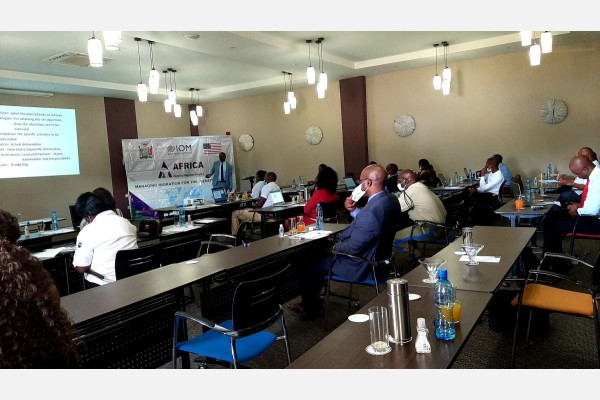Repository of Practices

Good Practices on developing the Migration Policy in Zambia
Dates
Type of practice
Summary
As a precursor to the development of the national migration policy and a way to ensure that the policy was evidence based, IOM supported the Government of Zambia to develop a National Migration Profile and the Migration Governance Indicators (MGIs). The national migration profile was developed by utilizing the framework of an inter-ministerial committee on migration data led by the Ministry of Home Affairs and Internal Security. The inter-ministerial committee is co-chaired by the Department of Immigration and the Zambia Statistics Agency.
The development of the migration profile involved capacity building for government officials and contributed to their increased awareness and understanding of migration issues. The assessment process for the MGIs also highlighted areas in migration management where Zambia was doing well or needed improvement.
Prior to the development of the National Migration Policy, stakeholder consultations were held to conduct a situation analysis and identify key priority issues. Some of the key issues that emerged included the need for a framework to promote safe and humane migration in order to harness the developmental potential of migration. There was also an emphasis on harmonizing definitions and indicators to ensure comparability of data within the country, regionally and internationally. Given the complexity and migration dynamics that Zambia experiences, stakeholders recommended strengthening capacity in migration management to ensure that the country has a coordinated response to migration. A perspective from the local authorities was that increase in urbanization has an effect on available infrastructure, thereby creating pressure on basic services. Subsequently, the local authorities may not adequately provide these services to the satisfaction of the citizenry. The stakeholders included representatives from line ministries, civil society entities, UN agencies, private sector, quasi-government institutions, local authorities, non-state actors and the academia.
During the drafting process, sector-specific submissions outlining the migration issues that are unique to each sector were requested and informed the thematic situational analysis of the National Migration Policy. The format of sector notes included situation analysis highlighting sector-specific migration challenges and opportunities against which a problem statement, general objective, specific objectives and strategies were crafted.
The draft Policy was submitted to a validation process by central level and provincial level stakeholders to validate the contents of the respective thematic areas. Further, a high-level validation was conducted involving senior government officials such as the Permanent Secretaries and Senior Directors to ensure that the draft Policy incorporated inputs from all ministries and resulted in high-level political buy-in. As per the Cabinet requirement, the draft Policy was realigned to the new administration after the elections.
Organizations
Main Implementing Organization(s)
Detailed Information
Partner/Donor Organizations
Benefit and Impact
Even before the implementation phase began, the National Migration Policy development activities have resulted in the following: Firstly, stakeholders can identify themselves as equal players in migration management and have demonstrated great appreciation of the cross-cutting nature of migration issues through a whole-of-government and whole of society approach. Secondly, stakeholders are demonstrating a better understanding of the importance of disaggregated and quality migration data for evidence-based policy formulation.
Key Lessons
- A whole-of-government and whole-of-society approach was upheld to ensure a wide range of stakeholders was included in the process as migration is cross-cutting across sectors;
- Consultative and participatory methodology: the draft National Migration Policy is a product of broader stakeholder inputs that are reflective of concrete examples from the sector specific migrations issues.
- Zambia embraces an inclusive and multi-sectoral approach to addressing migration. To ensure a vertical policy adherence, the Government through its decentralization approach will strengthen and empower the local and regional authorities to implement migration in their sector specific strategies to feed up to the national strategies on migration governance. On the other hand, to ensure horizontal policy adherence, steps will be taken to engage more development actors beyond the line ministries domain by making stakeholders appreciate their significant role they play in migration governance.
- Evidence-based: The draft Migration Policy was informed by the IOM’s Zambia Migration Profile, MGIs and Sector specific notes.
- Awareness-raising of migrants’ human rights: A consensus was developed that the National Migration Policy had to be in line with the international standards including those on human rights, for example the Universal Declaration of Human Rights to which Zambia is party. To make this practical, there was deliberate effort to reflect this in the first principle of the policy: “Human rights and dignity, equality, social justice and non-discrimination”.
Recommendations(if the practice is to be replicated)
- An inclusive and multi-sectoral approach to addressing migration in the spirit of whole-of government and whole-of-society approach.
- Unlike engaging the consultants, using the locally available expertise is part of owning and sustaining the process.
- The coordinated approach to developing the migration policy gives a perspective that migration issues cannot be addressed in isolation but require cooperation among all stakeholders.
Innovation
Additional Resources
Date submitted:
Disclaimer: The content of this practice reflects the views of the implementers and does not necessarily reflect the views of the United Nations, the United Nations Network on Migration, and its members.
More Related Practices:
- Migrant Domestic Workers Rights on the Threshold of Czech Households
- Libro: “A 20 años de la Ley de Migraciones”
- Gestión coordinada de la DTM en la frontera Chile-Bolivia
- Integración de la movilidad humana por motivos ambientales y climáticos en el Plan Nacional de Adaptación al Cambio Climático de Ecuador
- Coordinated Management of the DTM at the Chilean-Bolivian border
Peer Reviewer Feedback:
*References to Kosovo shall be understood to be in the context of United Nations Security Council resolution 1244 (1999).
Newsletter
Subscribe to our newsletter.